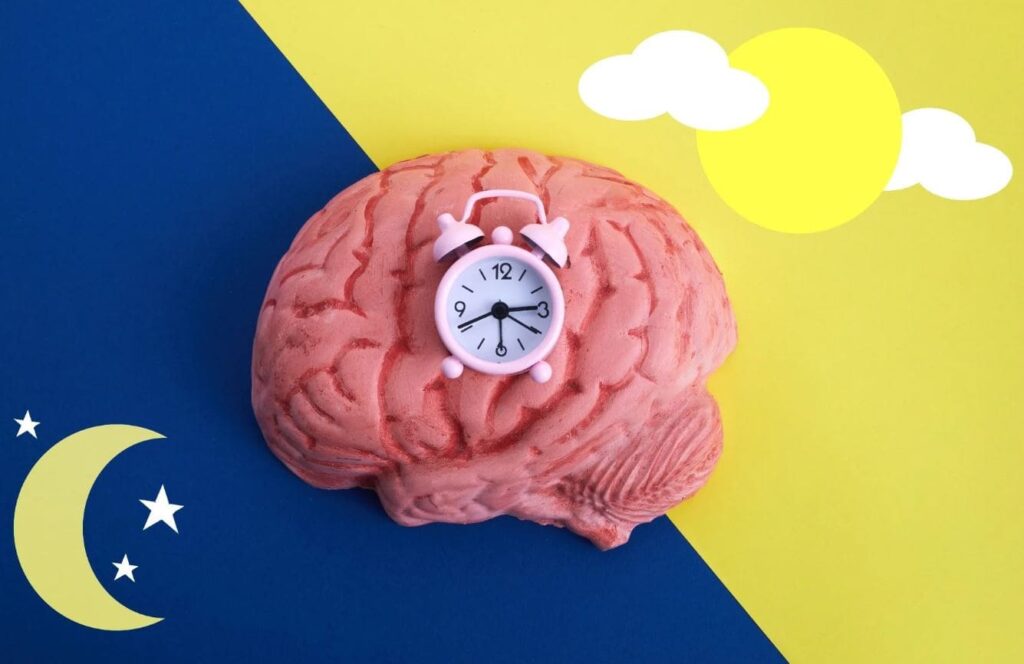Introduction
The biological clock impacts the physiological functioning of the human body. This system regulates the production of certain body hormones and affects human behavior and health in different ways. Moreover, a circadian disruption can be detrimental to a person’s overall well-being. In particular, the biological clock influences behaviors, such as sleep patterns and eating habits, and human health, including psychological well-being and the risk of developing metabolic diseases.
Effect on Human Behavior
Several human behaviors, such as sleep cycle and eating habits, are significantly affected by the circadian clock. This system impacts sleep-wake patterns by linking the endocrine system in the body to the changes in light and darkness that happen in the environment (Sato 2022, para. 5). Accordingly, the production of certain hormones occurs during specific times of the day. There is an increase in melatonin production when darkness sets in, contrasted with the low amounts released during the day (Sato 2022, para. 6). This hormone is released in a time-restricted manner to control sleep. Another behavior impacted by the circadian rhythm is eating habits since this system increases or lowers the secretion of leptin in order to influence a person’s appetite (Sato 2022, para. 7). The amount of this hormone varies at different times of the day depending on the biological clock of the person. Therefore, the circadian clock affects how or when people eat and sleep.

Impact on Mental Health
The biological clock affects the risk of experiencing depression and anxiety. In one study, the researchers found that employees working during night shifts have 40% higher chances of experiencing depression compared to daytime workers (Epstein & Hassan 2020, para. 6). The people’s psychological well-being can be adversely affected if their work does not align with the biological clock. Moreover, the symptoms of depression are influenced by the level of disruption in sleep patterns and circadian rhythms (Epstein & Hassan 2020, para. 7). These two factors can be correlated to prove that the biological clock affects mental health. In turn, the researchers also found that the level of anxiety is higher in healthcare providers with shift work disorder and travelers who have been jet lagged (Epstein & Hassan 2020, para. 9). These research findings show that alterations in the person’s circadian rhythm can cause anxiety. As a result, the changes in the biological clock should be avoided to prevent mental health problems.
Metabolic Diseases
The circadian clock affects the risk of developing metabolic diseases. People who experience disruptions in the biological clock tend to experience some issues with obesity and diabetes (Fishbein, Knutson & Zee 2021, p. 5). The changes in the circadian rhythm may adversely affect metabolism, subsequently causing the metabolic diseases mentioned above. Besides, the biological clock impacts the risk of cardiovascular diseases since it controls several prothrombotic factors, including the amount of platelets at different times of the day (Fishbein, Knutson & Zee 2021, p. 5). As such, the circadian system affects cardiovascular health. Hence, the chances of developing various diseases can be reduced by avoiding circadian disruptions.
Conclusion
The circadian rhythm regulates sleep patterns and food intake and affects both the psychological health of individuals and their risk of developing metabolic diseases. The biological clock impacts human behavior by controlling the secretion of certain hormones. In turn, the changes in this system increase the risk of experiencing mental health issues, such as depression and anxiety. Furthermore, these alterations can adversely affect metabolism and cause certain health problems. Thus, people should be educated on the adverse effects of circadian disruption to enhance their behavior and health.
Reference List
Epstein, L & Hassan, SM 2020, ‘Why your sleep and wake cycles affect your mood’, Harvard Medical School. Available from: <https://www.health.harvard.edu/blog/why-your-sleep-and-wake-cycles-affect-your-mood-2020051319792>. [10 July 2023].
Fishbein, AB, Knutson, KL & Zee, PC 2021, ‘Circadian disruption and human health’, Journal of Clinical Investigation, vol. 131, no. 19, pp. 1–13, viewed 10 July 2023, DOI: 10.1172/jci148286.
Sato, S 2022, ‘Your body’s internal clock dictates when you eat, sleep and might have a heart attack — All based on time of day’, Texas A&M University. Available from: <https://today.tamu.edu/2022/07/05/your-bodys-internal-clock-dictates-when-you-eat-sleep-and-might-have-a-heart-attack-all-based-on-time-of-day/>. [10 July 2023].


